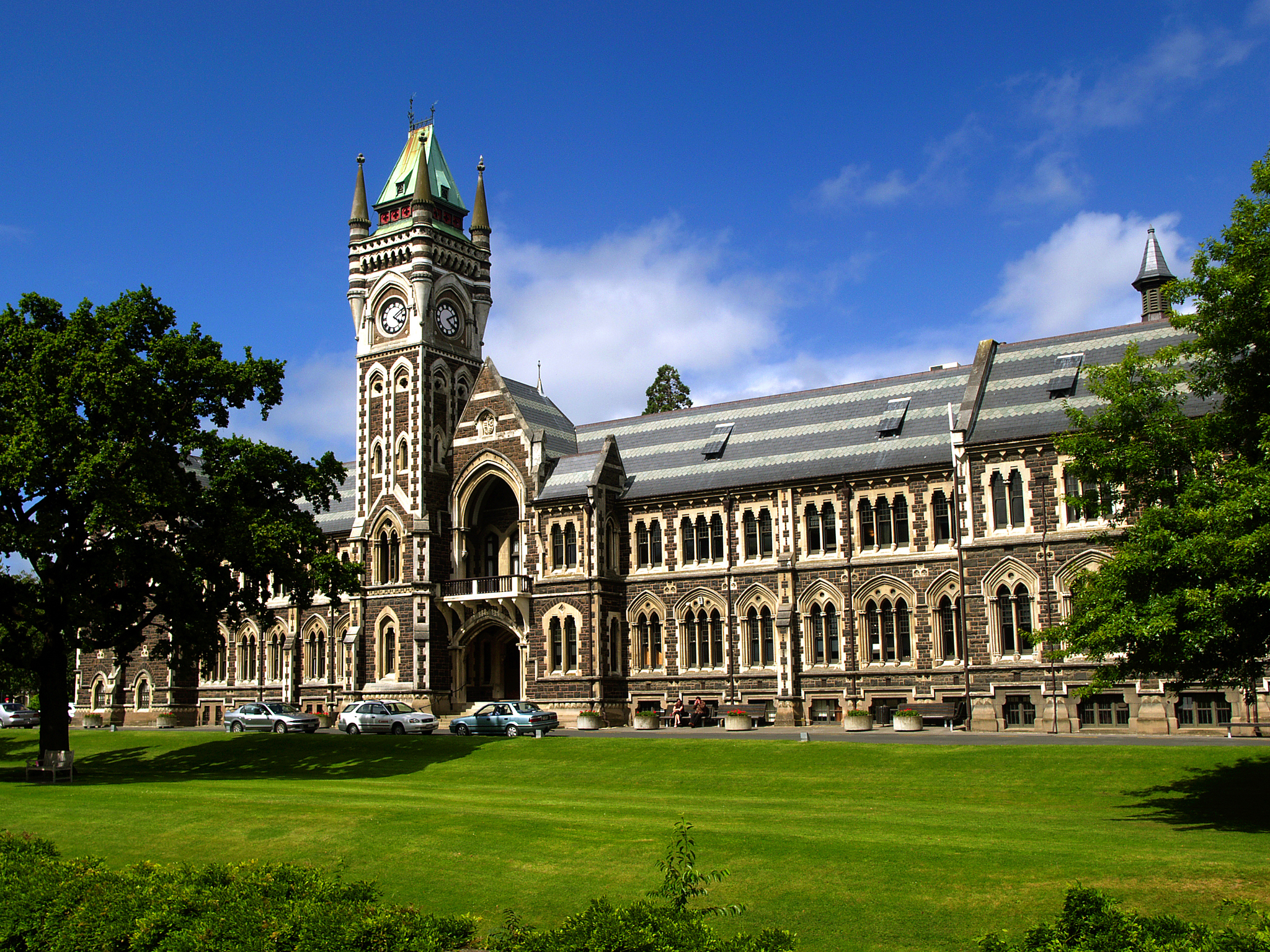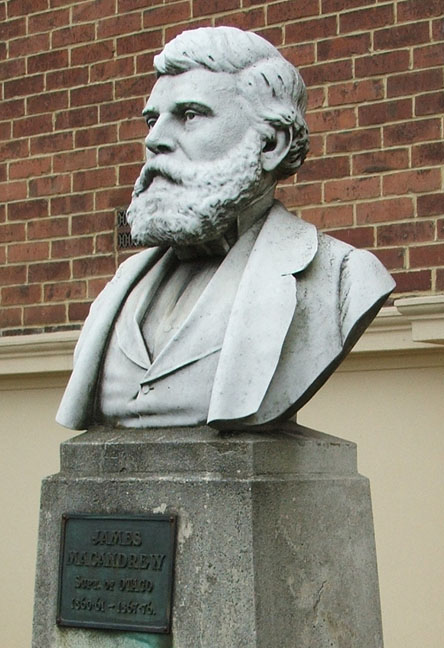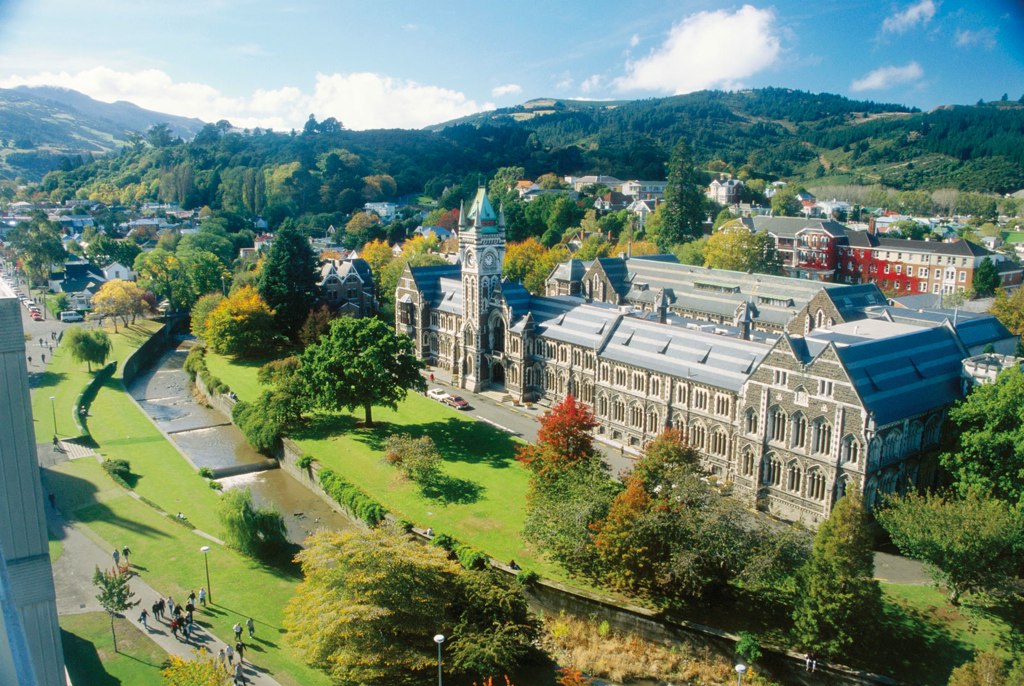|
University Of Otago
, image_name = University of Otago Registry Building2.jpg , image_size = , caption = University clock tower , motto = la, Sapere aude , mottoeng = Dare to be wise , established = 1869; 152 years ago , type = Public research collegiate university , endowment = NZD $279.9 million (31 December 2021) , budget = NZD $756.8 million (31 December 2020) , chancellor = Stephen Higgs , vice_chancellor = David Murdoch , administrative_staff = 2,246 (2019) , academic_staff = 1,744 (2019) , students = 21,240 (2019) , undergrad = 15,635 (2014) , postgrad = 4,378 (2014) , doctoral = 1,579 (2019) , other = , city = Dunedin , province = Otago , country = New Zealand (Māori: ''Ōtepoti, Ōtākou, Aotearoa'') , coor = , campus = Urban/University town 45 ha (111 acres) , colours = Dunedin Blue and Gold , free_label = Student Magazine , free = ''Critic'' , affiliations = MNU , website https://www.otago.ac.nz, logo = Logo of the University of Otago.svg The Unive ... [...More Info...] [...Related Items...] OR: [Wikipedia] [Google] [Baidu] |
University Of Otago Registry Building
The University of Otago Registry Building, also known as the Clocktower Building, is a Victorian and later structure in the city of Dunedin, New Zealand. It stands next to the banks of the Water of Leith and is constructed from contrasting dark Leith Valley basalt and Oamaru stone, with a foundation of Port Chalmers breccia. The building houses the administrative centre of the university, and the office of the Vice-Chancellor. It has a Category I listing with Heritage New Zealand. It is the principal element of the Clocktower complex, the group of Gothic revival buildings at the heart of the University of Otago's campus (University of Otago Clocktower complex). The most prominent of the group it was designed and re-designed by Maxwell Bury (1825–1912) and Edmund Anscombe (1874–1948), between the 1870s and the 1920s. This resulted in a revised geometry and a change to the original conception. History Bury first conceived a classical building which he re-dressed in the Gothic ... [...More Info...] [...Related Items...] OR: [Wikipedia] [Google] [Baidu] |
Flatting
A roommate is a person with whom one shares a living facility such as a room or dormitory ''except'' when being family or romantically involved. Similar terms include dormmate, suitemate, housemate, or flatmate ("flat": the usual term in British English for an apartment). Flatmate is the term most commonly used in New Zealand, when referring to the rental of an unshared room within any type of dwelling. Another similar term is sharemate (shared living spaces are often called ''sharehouses'' in Australia and other Commonwealth countries). A sharehome is a model of household in which a group of usually unrelated people reside together. The term generally applies to people living together in rental properties rather than in properties in which any resident is an owner occupier. In the UK, the term "roommate" means a person living in the same ''bedroom'', whereas in the United States and Canada, "roommate" and "housemate" are used interchangeably regardless whether a bedroom is sha ... [...More Info...] [...Related Items...] OR: [Wikipedia] [Google] [Baidu] |
Te Ara – The Encyclopedia Of New Zealand
''Te Ara: The Encyclopedia of New Zealand'' is an online encyclopedia established in 2001 by the New Zealand Government's Ministry for Culture and Heritage. The web-based content was developed in stages over the next several years; the first sections were published in 2005, and the last in 2014 marking its completion. ''Te Ara'' means "the pathway" in the Māori language, and contains over three million words in articles from over 450 authors. Over 30,000 images and video clips are included from thousands of contributors. History New Zealand's first recognisable encyclopedia was ''The Cyclopedia of New Zealand'', a commercial venture compiled and published between 1897 and 1908 in which businesses or people usually paid to be covered. In 1966 the New Zealand Government published ''An Encyclopaedia of New Zealand'', its first official encyclopedia, in three volumes. Although now superseded by ''Te Ara'', its historical importance led to its inclusion as a separate digital reso ... [...More Info...] [...Related Items...] OR: [Wikipedia] [Google] [Baidu] |
James Macandrew
James Macandrew (1819(?) – 25 February 1887) was a New Zealand ship-owner and politician. He served as a Member of Parliament from 1853 to 1887 and as the last Superintendent of Otago Province. Early life Macandrew was born in Scotland, probably in Aberdeen, where he was baptised on 18 May 1819. He became active in the Free Church of Scotland, and from there, in the proposed colonisation of Otago (which was being advocated by the Lay Association of the Free Church of Scotland, later the Otago Association). In partnership with his brother-in-law William Reynolds, Macandrew bought a schooner, loaded it with cargo, and set sail for Otago with his family. He arrived in January 1851. Still working in partnership with his brother-in-law, Macandrew immediately became a major figure in the business community of Dunedin. Reynolds, his brother-in-law, began to build up a shipping business, while Macandrew himself established a trading firm in the city. The partners later established ... [...More Info...] [...Related Items...] OR: [Wikipedia] [Google] [Baidu] |
Edward Gibbon Wakefield
Edward Gibbon Wakefield (20 March 179616 May 1862) is considered a key figure in the establishment of the colonies of South Australia and New Zealand (where he later served as a member of parliament). He also had significant interests in British North America, being involved in the drafting of Lord Durham's Report and being a member of the Parliament of the Province of Canada for a short time. He was best known for his colonisation scheme, sometimes referred to as the Wakefield scheme, which aimed to populate the new colony South Australia with a workable combination of labourers, tradespeople, artisans and capital. The scheme was to be financed by the sale of land to the capitalists who would thereby support the other classes of emigrants. Despite being imprisoned for three years in 1827 for kidnapping a fifteen-year-old girl in Britain, he enjoyed a distinguished political career. Early life Wakefield was born in London in 1796, the eldest son of Edward Wakefield (1774� ... [...More Info...] [...Related Items...] OR: [Wikipedia] [Google] [Baidu] |
Otago Association
The Otago Association was founded in 1845 by adherents of the Free Church of Scotland with the purpose of establishing a colony of like-minded Scots in Otago in the South Island of New Zealand, chiefly at Dunedin. In addition to religion, the economy was also a motivator in the association's foundation and operations. The Highland Clearances, crop failures, and population pressures in industrialised urban centres all created conditions that, by the mid-nineteenth century, made emigration seem attractive to many poorer Scots. John McGlashan was the association's secretary in Edinburgh, Scotland, from 1847. He would himself emigrate in 1853. The first two settler ships, '' John Wickliffe'' and ''Philip Laing'', under the command of William Cargill, sailed from Britain in late 1847 and arrived at what is now Port Chalmers on 23 March and 15 April 1848, respectively. About 12,000 immigrants arrived in Dunedin within a decade. See also * Canterbury Association * New Zealand Compa ... [...More Info...] [...Related Items...] OR: [Wikipedia] [Google] [Baidu] |
University Of Otago Grounds In Winter
A university () is an institution of higher (or tertiary) education and research which awards academic degrees in several academic disciplines. Universities typically offer both undergraduate and postgraduate programs. In the United States, the designation is reserved for colleges that have a graduate school. The word ''university'' is derived from the Latin ''universitas magistrorum et scholarium'', which roughly means "community of teachers and scholars". The first universities were created in Europe by Catholic Church monks. The University of Bologna (''Università di Bologna''), founded in 1088, is the first university in the sense of: *Being a high degree-awarding institute. *Having independence from the ecclesiastic schools, although conducted by both clergy and non-clergy. *Using the word ''universitas'' (which was coined at its foundation). *Issuing secular and non-secular degrees: grammar, rhetoric, logic, theology, canon law, notarial law.Hunt Janin: "The university in ... [...More Info...] [...Related Items...] OR: [Wikipedia] [Google] [Baidu] |
University Of Otago In Dunedin, NZ
A university () is an institution of higher (or tertiary) education and research which awards academic degrees in several academic disciplines. Universities typically offer both undergraduate and postgraduate programs. In the United States, the designation is reserved for colleges that have a graduate school. The word ''university'' is derived from the Latin ''universitas magistrorum et scholarium'', which roughly means "community of teachers and scholars". The first universities were created in Europe by Catholic Church monks. The University of Bologna (''Università di Bologna''), founded in 1088, is the first university in the sense of: *Being a high degree-awarding institute. *Having independence from the ecclesiastic schools, although conducted by both clergy and non-clergy. *Using the word ''universitas'' (which was coined at its foundation). *Issuing secular and non-secular degrees: grammar, rhetoric, logic, theology, canon law, notarial law.Hunt Janin: "The university in ... [...More Info...] [...Related Items...] OR: [Wikipedia] [Google] [Baidu] |
University Of Otago
, image_name = University of Otago Registry Building2.jpg , image_size = , caption = University clock tower , motto = la, Sapere aude , mottoeng = Dare to be wise , established = 1869; 152 years ago , type = Public research collegiate university , endowment = NZD $279.9 million (31 December 2021) , budget = NZD $756.8 million (31 December 2020) , chancellor = Stephen Higgs , vice_chancellor = David Murdoch , administrative_staff = 2,246 (2019) , academic_staff = 1,744 (2019) , students = 21,240 (2019) , undergrad = 15,635 (2014) , postgrad = 4,378 (2014) , doctoral = 1,579 (2019) , other = , city = Dunedin , province = Otago , country = New Zealand (Māori: ''Ōtepoti, Ōtākou, Aotearoa'') , coor = , campus = Urban/University town 45 ha (111 acres) , colours = Dunedin Blue and Gold , free_label = Student Magazine , free = ''Critic'' , affiliations = MNU , website https://www.otago.ac.nz, logo = Logo of the University of Otago.svg The Unive ... [...More Info...] [...Related Items...] OR: [Wikipedia] [Google] [Baidu] |
Huffington Post
''HuffPost'' (formerly ''The Huffington Post'' until 2017 and sometimes abbreviated ''HuffPo'') is an American progressive news website, with localized and international editions. The site offers news, satire, blogs, and original content, and covers politics, business, entertainment, environment, technology, popular media, lifestyle, culture, comedy, healthy living, women's interests, and local news featuring columnists. It was created to provide a progressive alternative to the conservative news websites such as the Drudge Report. The site offers content posted directly on the site as well as user-generated content via video blogging, audio, and photo. In 2012, the website became the first commercially run United States digital media enterprise to win a Pulitzer Prize. Founded by Andrew Breitbart, Arianna Huffington, Kenneth Lerer, and Jonah Peretti, the site was launched on May 9, 2005 as a counterpart to the Drudge Report. In March 2011, it was acquired by AOL for US$315&n ... [...More Info...] [...Related Items...] OR: [Wikipedia] [Google] [Baidu] |
The Huffington Post
''HuffPost'' (formerly ''The Huffington Post'' until 2017 and sometimes abbreviated ''HuffPo'') is an American progressive news website, with localized and international editions. The site offers news, satire, blogs, and original content, and covers politics, business, entertainment, environment, technology, popular media, lifestyle, culture, comedy, healthy living, women's interests, and local news featuring columnists. It was created to provide a progressive alternative to the conservative news websites such as the Drudge Report. The site offers content posted directly on the site as well as user-generated content via video blogging, audio, and photo. In 2012, the website became the first commercially run United States digital media enterprise to win a Pulitzer Prize. Founded by Andrew Breitbart, Arianna Huffington, Kenneth Lerer, and Jonah Peretti, the site was launched on May 9, 2005 as a counterpart to the Drudge Report. In March 2011, it was acquired by AOL for US$315& ... [...More Info...] [...Related Items...] OR: [Wikipedia] [Google] [Baidu] |






